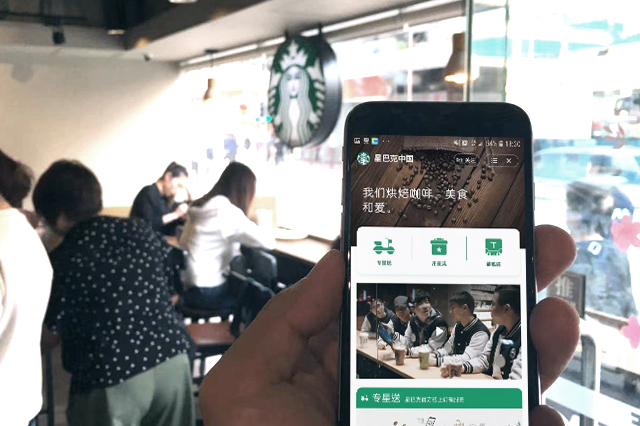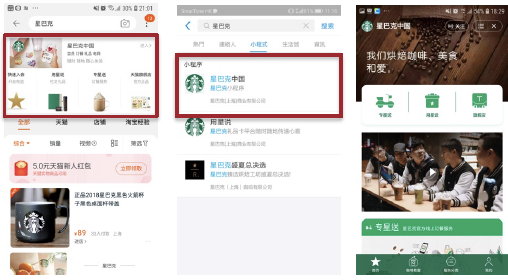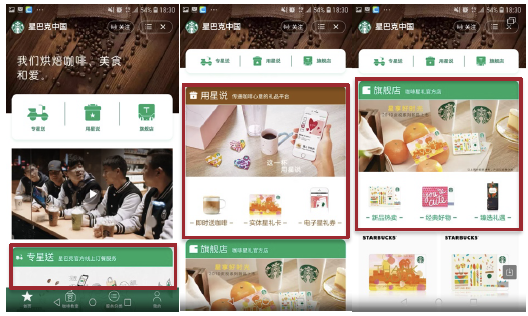
albert Chan
In December 2018, Starbucks announced the launch of a new mini program, a lite app developed within Alibaba’s platform that is similar to a WeChat mini program. The launch was part of a larger partnership between Starbucks and Alibaba announced in August 2018, which was a deep, strategic relationship to facilitate offline-online integration for Starbucks.
The mini program provides a unified, one-stop digital customer experience that links Starbucks’ offerings with Alibaba’s mobile apps including Taobao, Tmall and Alipay. Prior to this, upon Alibaba’s official launch of mini programs in early August 2018, companies including Ctrip, Airbnb and others have already launched mini programs powered by Alibaba.
Normally, when users log into Taobao and search for a brand, they will see the brand’s Tmall flagship store at the top, followed by a list of products from that brand. However, when a user now searches for Starbucks in Taobao, users will see the brand’s mini program — a lite app similar to a WeChat mini program — at the top instead. Aside from Taobao, Starbucks’ mini program can also be accessed via Alipay.
[caption id="attachment_77163" align="aligncenter" width="508"] Users searching for Starbucks in Taobao (left) and Alipay (center) will see the mini program on the top, and see the Starbucks mini program (right) after tapping on it.
Users searching for Starbucks in Taobao (left) and Alipay (center) will see the mini program on the top, and see the Starbucks mini program (right) after tapping on it.
Source: Alibaba/Starbucks[/caption] Starbucks’ Mini Program Provides a One-Stop Experience for its Services In the mini program, users can order deliveries through “Starbucks Delivers,” send social gifting through “Say it with Starbucks” and purchase merchandise from Starbucks’ Tmall flagship store. Those users who are not already members of the Starbucks Reward loyalty program can use their Taobao accounts to apply for membership within the mini program. [caption id="attachment_77166" align="aligncenter" width="528"] Different functions of the Starbucks mini program, including Starbucks Delivers (left), Say it with Starbucks (center) and Tmall flagship store (right).
Different functions of the Starbucks mini program, including Starbucks Delivers (left), Say it with Starbucks (center) and Tmall flagship store (right).
Source: Alibaba/Starbucks[/caption] Starbucks’ Mini Program Represents a Key Milestone in Its Strategic Partnership with Alibaba In August 2018, Starbucks and Alibaba jointly announced a deep, strategic “New Retail” partnership that will enable Starbucks to create a seamless customer experience. The partnership involved improving delivery and order fulfillment, membership integration, and creating a new virtual store platform for Starbucks, i.e. Starbucks’ mini program. To achieve this, the entire Alibaba ecosystem including Ele.me, Hema, Tmall, Taobao and Alipay would be involved. Prior to the launch of Starbucks’ mini program, Starbucks worked with Ele.me, Alibaba’s on-demand food delivery platform in China, to launch a delivery service. Pilot deliveries were undertaken in September 2018 and rolled out in full at the end of 2018. Also in September 2018, Starbucks partnered with Alibaba’s Hema/Freshippo supermarkets to set up Starbucks Delivery Kitchens in selected supermarket locations, with the objective of complementing the delivery fulfillment capabilities of existing and future Starbucks stores. Then, in December 2018, Starbucks’ mini program was launched, which is a key achievement of the strategic partnership between Alibaba and Starbucks. Alibaba Aims to Exemplify its Capability and Set New Standard for New Retail The launch of the Starbucks mini program demonstrates Alibaba’s ability to empower traditional retailers through a unique system, which supports enterprises in undergoing digital transformation. In addition, this initiative will also help Alibaba deepen partnership with Starbucks through innovating customers’ experiences. Xu Hong, Vice President of Alibaba Group, commented that Alibaba’s ecosystem is one of the most dynamic and inclusive digital ecosystems in China, in which Starbucks’ mini program will set a new standard in “New Retail” experience for Chinese consumers. This Cooperation Allows Starbucks to Catch Up in the Digital Space with Its China Competitor Luckin Coffee Starbucks’ mini program is a key step in Starbuck’s strategic partnership with Alibaba announced in August 2018. With access to Alibaba’s ecosystem, the mini program will help Starbucks gain a more comprehensive overview of customers’ actions, encourage more customers to enroll into its Starbucks Rewards membership program, and further expand its digital space in China. As of December 2018, Starbucks and Alibaba had a combined 670 million active users. Furthermore, the mini program will allow current and potential Starbucks Rewards members to earn loyalty points from more avenues than previously. Earlier in September 2018, Luckin Coffee, Starbucks’ main competitor in China, had announced its partnership with Tencent on their WeChat platforms. The partnership involved Tencent integrating AI and other technologies into Luckin Coffee’s operations including delivery and payment systems, which could help Luckin Coffee better predict and meet demands and preferences of its customers. Starbucks’ mini program, which leveraged Alibaba’s digital technologies, can be seen as Starbucks’ move to catch up on the digital front. Key Insights The initiative of the Starbucks mini program brings potential benefits for both Starbucks and Alibaba. For Starbucks, it could use this initiative to provide users with a one-stop digital experience that also enables customers to earn loyalty points from Alibaba’s retail marketplaces. For Alibaba, the initiative illustrates its capability of empowering traditional retailers and also helps to drive traffic to its platforms Tmall, Taobao and Alipay. Leveraging such benefits, it is possible that Starbucks and Alibaba can support momentum in sales growth, loyalty scheme memberships and also app users in future.
 Users searching for Starbucks in Taobao (left) and Alipay (center) will see the mini program on the top, and see the Starbucks mini program (right) after tapping on it.
Users searching for Starbucks in Taobao (left) and Alipay (center) will see the mini program on the top, and see the Starbucks mini program (right) after tapping on it.Source: Alibaba/Starbucks[/caption] Starbucks’ Mini Program Provides a One-Stop Experience for its Services In the mini program, users can order deliveries through “Starbucks Delivers,” send social gifting through “Say it with Starbucks” and purchase merchandise from Starbucks’ Tmall flagship store. Those users who are not already members of the Starbucks Reward loyalty program can use their Taobao accounts to apply for membership within the mini program. [caption id="attachment_77166" align="aligncenter" width="528"]
 Different functions of the Starbucks mini program, including Starbucks Delivers (left), Say it with Starbucks (center) and Tmall flagship store (right).
Different functions of the Starbucks mini program, including Starbucks Delivers (left), Say it with Starbucks (center) and Tmall flagship store (right).Source: Alibaba/Starbucks[/caption] Starbucks’ Mini Program Represents a Key Milestone in Its Strategic Partnership with Alibaba In August 2018, Starbucks and Alibaba jointly announced a deep, strategic “New Retail” partnership that will enable Starbucks to create a seamless customer experience. The partnership involved improving delivery and order fulfillment, membership integration, and creating a new virtual store platform for Starbucks, i.e. Starbucks’ mini program. To achieve this, the entire Alibaba ecosystem including Ele.me, Hema, Tmall, Taobao and Alipay would be involved. Prior to the launch of Starbucks’ mini program, Starbucks worked with Ele.me, Alibaba’s on-demand food delivery platform in China, to launch a delivery service. Pilot deliveries were undertaken in September 2018 and rolled out in full at the end of 2018. Also in September 2018, Starbucks partnered with Alibaba’s Hema/Freshippo supermarkets to set up Starbucks Delivery Kitchens in selected supermarket locations, with the objective of complementing the delivery fulfillment capabilities of existing and future Starbucks stores. Then, in December 2018, Starbucks’ mini program was launched, which is a key achievement of the strategic partnership between Alibaba and Starbucks. Alibaba Aims to Exemplify its Capability and Set New Standard for New Retail The launch of the Starbucks mini program demonstrates Alibaba’s ability to empower traditional retailers through a unique system, which supports enterprises in undergoing digital transformation. In addition, this initiative will also help Alibaba deepen partnership with Starbucks through innovating customers’ experiences. Xu Hong, Vice President of Alibaba Group, commented that Alibaba’s ecosystem is one of the most dynamic and inclusive digital ecosystems in China, in which Starbucks’ mini program will set a new standard in “New Retail” experience for Chinese consumers. This Cooperation Allows Starbucks to Catch Up in the Digital Space with Its China Competitor Luckin Coffee Starbucks’ mini program is a key step in Starbuck’s strategic partnership with Alibaba announced in August 2018. With access to Alibaba’s ecosystem, the mini program will help Starbucks gain a more comprehensive overview of customers’ actions, encourage more customers to enroll into its Starbucks Rewards membership program, and further expand its digital space in China. As of December 2018, Starbucks and Alibaba had a combined 670 million active users. Furthermore, the mini program will allow current and potential Starbucks Rewards members to earn loyalty points from more avenues than previously. Earlier in September 2018, Luckin Coffee, Starbucks’ main competitor in China, had announced its partnership with Tencent on their WeChat platforms. The partnership involved Tencent integrating AI and other technologies into Luckin Coffee’s operations including delivery and payment systems, which could help Luckin Coffee better predict and meet demands and preferences of its customers. Starbucks’ mini program, which leveraged Alibaba’s digital technologies, can be seen as Starbucks’ move to catch up on the digital front. Key Insights The initiative of the Starbucks mini program brings potential benefits for both Starbucks and Alibaba. For Starbucks, it could use this initiative to provide users with a one-stop digital experience that also enables customers to earn loyalty points from Alibaba’s retail marketplaces. For Alibaba, the initiative illustrates its capability of empowering traditional retailers and also helps to drive traffic to its platforms Tmall, Taobao and Alipay. Leveraging such benefits, it is possible that Starbucks and Alibaba can support momentum in sales growth, loyalty scheme memberships and also app users in future.